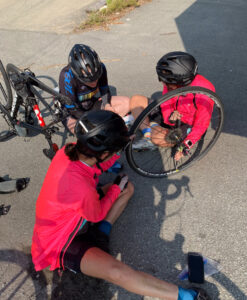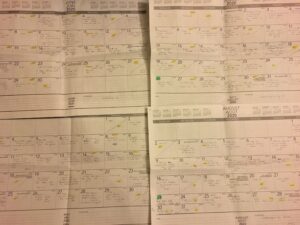
Over the past few months I’ve come to realize that planning is a double-edged sword. It’s great to make a training plan for an upcoming race—but the plan has to be fluid. As a novelist, I should know this. I depend on the outline I make for a novel, but I’m always ready to change it if the story or the characters demand it.
The same is true for training plans, though this has taken me longer to learn. They’re great in theory, but they cannot (and must not) take the place of intuition.
Every single time I’ve made or followed a training plan, I’ve gotten myself into trouble. My problem is that I’m very good at following a plan. Too good. If it’s on the plan, I do it—no hesitation, no questions asked.
But it seems when I have a plan, it takes over everything, and I stop listening to my body. Numbers take hold of me. Deadlines loom. I start worrying that if I don’t do exactly what’s on the plan, I won’t get there in time. And then I don’t listen when something in my body complains that I’ve gone too far or too fast, and of course… I end up paying the price.
Turns out it’s no coincidence that the best training I ever did was this past year when there were no races and I threw out my plan. I had some goals, but they were always tentative. Mostly I trained by feel. If I felt like running 25K on a Sunday, I did it. If I didn’t feel quite up to that, I did less. There was no judgment involved; I didn’t feel good or bad about what I did. I listened to my body. There was no pressure to go faster or do more, because it didn’t matter. The only thing that mattered was doing what I believed my body could handle and stopping when it was right to stop.
And then races crept back in (or the idea of them, because who are we kidding? There are no races yet). And suddenly there I was with my calendar, putting in the numbers and following them blindly. The only smart thing I’ve done so far is to use a pencil rather than a pen.
Nothing can take the place of body awareness. It’s the most important part of this process. If something doesn’t feel right, you have to stop. A looming race does not mean you should do more distance than you’re ready for or push harder on your speed. That’s a recipe for disaster. But it’s a disaster I seem to fall prey to time and again.
This past year, that didn’t happen, but I didn’t understand why until this very morning—and it took a friend to point it out to me. It wasn’t because I’d trained less. In fact, in 2020 I rode and ran almost 1,000KM more (in each sport) than I had during the previous year when I’d been training for the Ironman—and with zero injuries. The thing was, there was no pressure to do more than my body could handle. So I never did.

These were filled in AFTER I’d done them, not before.
There’s a huge lesson in this. I only hope I manage to remember it long enough to spare me from the next injury. In the meantime, I’ve buried my marathon training plan in a pile of papers on my desk.
Leave a Reply